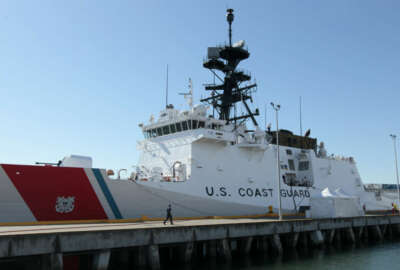
Coast Guard upping recruiting effort as military feels pinch in talent pool
All of the military services are having issues recruiting enough people to fill their ranks.
Best listening experience is on Chrome, Firefox or Safari. Subscribe to Federal Drive’s daily audio interviews on Apple Podcasts or PodcastOne.
The Coast Guard is thinking ahead about how it will keep its ranks full in future years as all of the military services are feeling the crunch of a smaller talent pool and lower propensity to join the service.
Testifying before the House Transportation and Infrastructure Committee Wednesday, Coast Guard Commandant Adm. Linda Fagan said the service needs to change its policies and tactics to become more attractive to potential recruit.
“Talent management is critically important for the Coast Guard today, as it is for all organizations,” she said. “Our current personnel system has not changed significantly in 75 years. People serving in the military today have different expectations for their professional lives, and we must adjust the way we recruit, train, and retain our people to continue to be an employer of choice.”
To face the recruiting issue head-on, Fagan said the Coast Guard stood up an integrated team run by a one-star admiral to look at recruitment.
The Coast Guard is about 1,100 service members short in the non-rated positions.
In May, the service put out its Ready Workforce 2030 plan. That strategy’s first tenant is to transform the talent management system.
“We will transform how our recruiting practices identify who we need, and when and where we need them,” the strategy states. “Policies will be agile and allow recruiters the flexibility to target individuals with the right skill sets at the right time and quickly onboard them at a grade level commensurate with their specialized skills in order to meet emerging missions. Our recruiting efforts will have to include active pursuit of potential employees where they are. This requires a shift from recruiting from storefronts to connecting with prospective members on their homefronts.”
The plan outlines several ways the Coast Guard will improve recruiting and retention. Those include adaptive ways to market to potential recruits, creating a virtual recruiting office, exploring non-monetary incentives-bases reenlistment alternatives and making careers more flexible through work-life balance benefits.
In recent years, the service tripled the number of children in childcare, giving service members more flexibility with their jobs.
The Coast Guard is still riding high on historic retention rates that reach to the high 90% range. That beats out the other services, which are still dealing with retention rates in the 80% to 90% range.
Recruiting is on the mind of all the military services.
Only about 23% of 17- to 24-year-olds have the physical and academic qualifications to join the military without a waiver. Out of that pool a dwindling number are interested in serving.
COVID-19 took a toll on recruitment initiatives. The Army announced Tuesday that it is creating a preparatory course to help people who do not meet their standards get into basic training. The Army cut its expected end strength in 2023 due to recruiting issues.
Copyright © 2025 Federal News Network. All rights reserved. This website is not intended for users located within the European Economic Area.
Scott Maucione is a defense reporter for Federal News Network and reports on human capital, workforce and the Defense Department at-large.
Follow @smaucioneWFED





